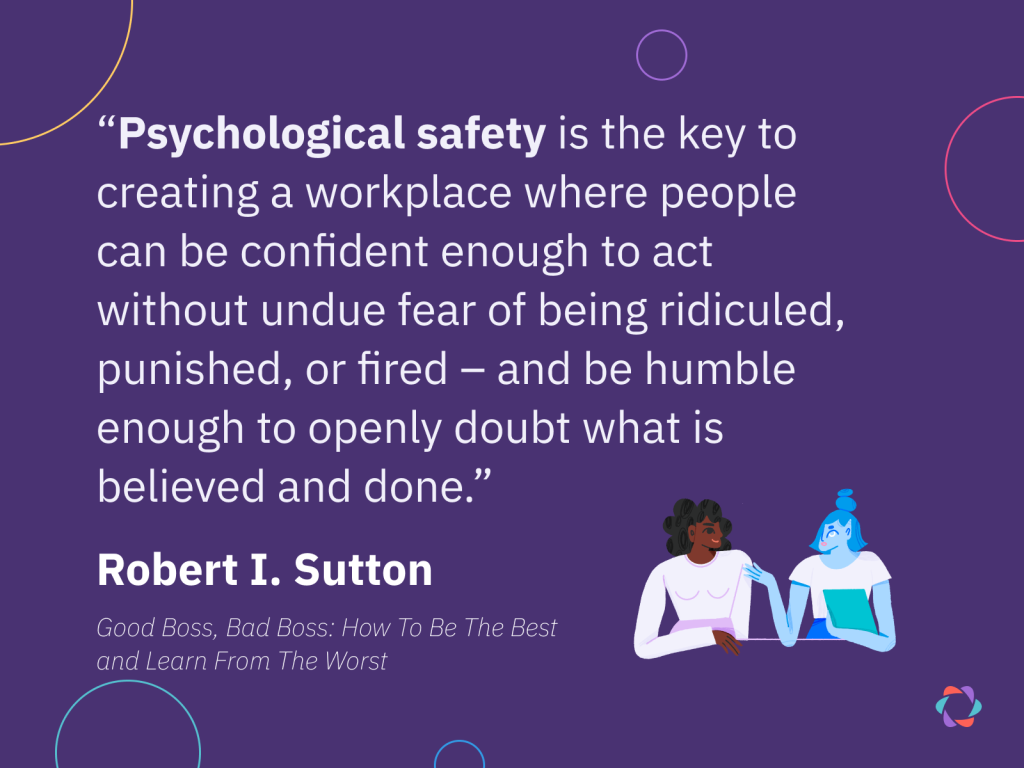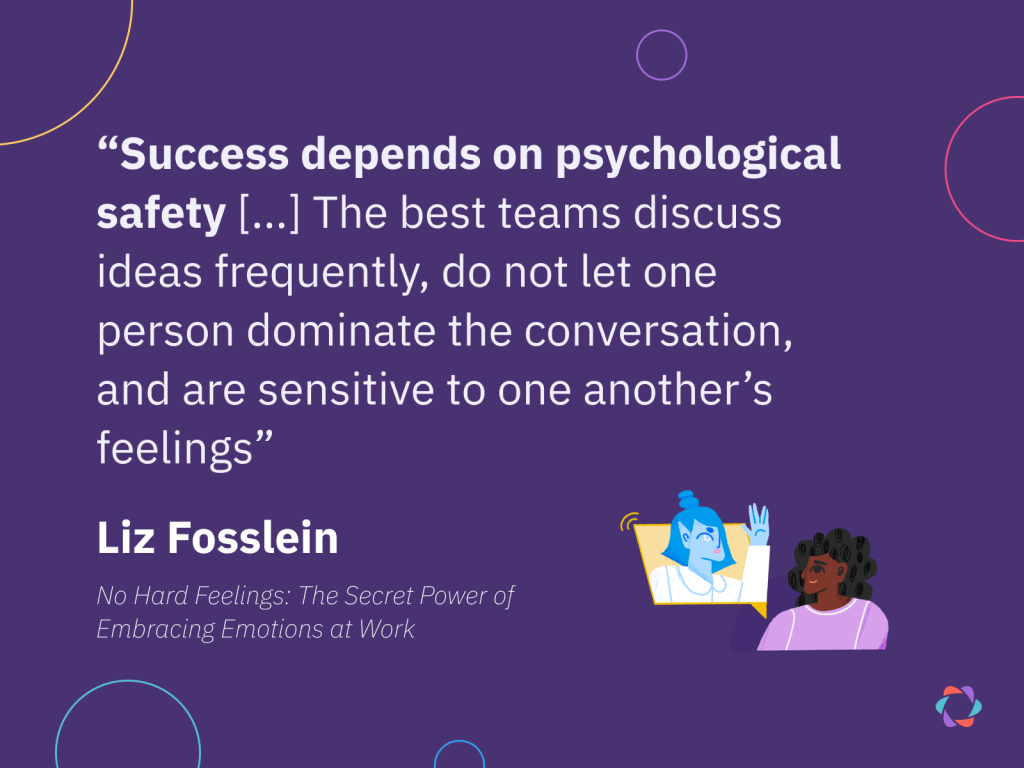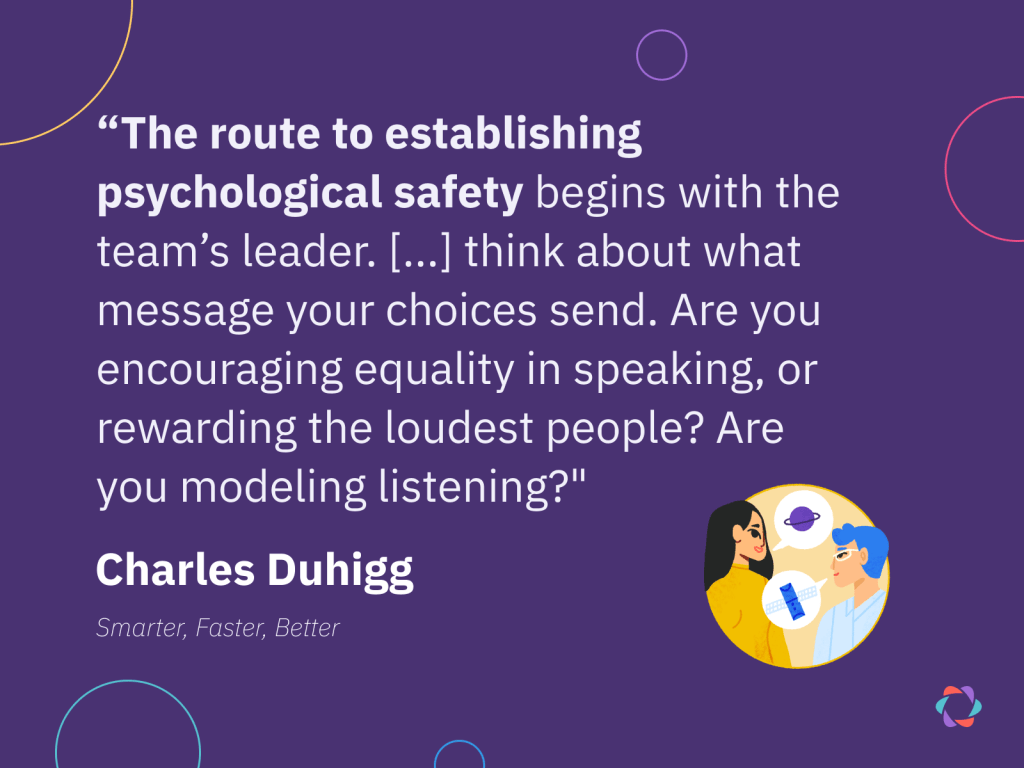41 Psychological Safety Quotes + Practical Directives

Psychological safety has become a buzzword ever since it was coined in 1999 by Harvard’s Amy C. Edmondson. It’s become even more popular since more teams have started working remotely, and there’s a greater general awareness of mental health, inclusion, and agile ways of working.
But the tricky thing about psychological safety is how to transform an unsafe team struggling with imposter syndrome, blame culture, and fear of judgment, into one that is psychologically safe, open, and knows that failure is a learning opportunity?
We’ve put together a selection of expert quotes on psychological safety for you to share with your team, whether that’s in a presentation, a meeting like a retrospective, or in your own article! Maybe it will also help you transform your team into a high-performing psychologically safe group.
Check out our *detailed guide for how to create a psychologically safe team*, complete with a set of questions to help you assess your team’s safety level.
Psychological safety definition quotes
Looking for a simple definition of psychological safety to share with your team? Here are a few of the best psychological safety definitions from across the internet and printed literature.

- Psychological safety is “the belief that one will not be punished or humiliated for speaking up with ideas, questions, concerns or mistakes.” – Amy C. Edmondson
- “Team psychological safety is defined as a shared belief that the team is safe for interpersonal risk taking” – Amy C. Edmondson
- “Psychological safety is not about being nice or lowering performance standards, it’s about giving candid feedback, openly admitting mistakes, and learning from them.” – Amy C. Edmondson
- “Psychological safety does not mean that you feel comfortable all the time. Psychological safety means you feel comfortable talking about what makes you uncomfortable.” – Esther Derby
- “Psychological safety—the belief that you can take a risk without being penalized or punished.” – Adam M. Grant
- “Psychological safety is the key to creating a workplace where people can be confident enough to act without undue fear of being ridiculed, punished, or fired – and be humble enough to openly doubt what is believed and done.” – Robert I. Sutton
Psychological safety benefits quotes
Psychological safety isn’t just a nice to have. It improves peoples’ working lives, helps people build deeper more meaningful relationships, and it makes business sense.

- “Freedom from fear requires feeling safe. If you feel safe, you run experiments. You stop asking permission. You avoid long, mind-numbing meetings. You create a new kind of culture in which you accept that mistakes are inevitable. You learn that small, fast mistakes are preferable to the big, slow, deadly mistakes you are making today.” – Richard Sheridan
- “John Wooden, the legendary basketball coach, says you aren’t a failure until you start to blame. What he means is that you can still be in the process of learning from your mistakes until you deny them.” – Carol Dweck
- “Success depends on psychological safety. At Google, members of teams with high levels of psychological safety were less likely to leave their jobs, brought in more revenue, and were rated effective twice as often by executives. MIT researchers who studied team performance came to the same conclusion: simply grouping smart people together doesn’t guarantee a smart team. Online and off, the best teams discuss ideas frequently, do not let one person dominate the conversation, and are sensitive to one another’s feelings.” – Liz Fosslein
- “We thrive in environments that respect us and allow us to (1) feel included, (2) feel safe to learn, (3) feel safe to contribute, and (4) feel safe to challenge the status quo. If we can’t do these things, if it’s emotionally expensive, fear shuts us down. We’re not happy and we’re not reaching our potential. But when the environment nurtures psychological safety, there’s an explosion of confidence, engagement, and performance. Ask yourself if you feel included, safe to learn, safe to contribute, and safe to challenge the status quo. Finally, ask yourself if you’re creating an environment where others can do these four things. In the process, look around and see others with respect and fresh amazement, find deeper communion in your relationships, and more happiness and satisfaction in your own life” – Timothy R. Clark
- “The role you play as a leader is helping people experience relatedness at work: caring about and feeling cared about, feeling connected without ulterior motives, and contributing to something greater than oneself” – Susan Fowler
Psychological safety teamwork quotes
Teamwork is at the core of psychological safety. Teams without psych safety work as individuals who are suspicious or threatened by one another. The magic of teamwork happens when every individual feels safe being transparent and vulnerable with peers.
- “Teams need to believe that their work is important. Teams need to feel their work is personally meaningful. Teams need clear goals and defined roles. Team members need to know they can depend on one another. But, most important, teams need psychological safety” – Charles Duhigg
- “A team is not a group of people who work together. A team is a group of people who trust each other.” – Simon Sinek
- “”For knowledge work to flourish, the workplace must be one where people feel able to share their knowledge! This means sharing concerns, questions, mistakes, and half-formed ideas.” – Amy C. Edmondson
- “Lacking a sense of psychological safety, people shut down, often without realizing it. They are less likely to seek or accept feedback and also less likely to experiment, to discuss errors, and to speak up about potential or actual problems.”– Christine Porath
- “It is amazing what you can accomplish if you do not care who gets the credit.” – Geoff Watts
- “”Low levels of psychological safety can create a culture of silence. They can also create a Cassandra culture – an environment in which speaking up is belittled and warnings go unheeded.” – Amy C. Edmondson
- Finding out that you are wrong is even more valuable than being right, because you are learning.” – Amy C. Edmondson
- “Remember teamwork begins by building trust. And the only way to do that is to overcome our need for invulnerability.” – Patrick Lencioni
- “There’s zero correlation between being the best talker and having the best ideas.”- Susan Cain
- “The kind of trust that is necessary to build a great team is what I call vulnerability-based trust. This is what happens when members get to a point where they are completely comfortable being transparent, honest, and naked with one another, where they say and genuinely mean things like “I screwed up,” “I need help,” “Your idea is better than mine,” “I wish I could learn to do that as well as you do,” and even, “I’m sorry.” When everyone on a team knows that everyone else is vulnerable enough to say and mean those things, and that no one is going to hide his or her weaknesses or mistakes, they develop a deep and uncommon sense of trust. They speak more freely and fearlessly with one another and don’t waste time and energy putting on airs or pretending to be someone they’re not. Over time, this creates a bond that exceeds what many people ever experience in their lives and,” – Patrick Lencioni
- “Part of the vulnerability of not having all the answers is the humility to share your ideas with your team before they’re fully formulated.” – Richard Sheridan
- “Without psychological safety, your team members waste valuable time and energy avoiding embarrassment or hiding their mistakes rather than focusing on reaching team goals.” – Eric Karpinski in Put Happiness to Work
- “A team without a Why can be misaligned and directionless, while a powerful Why provides psychological safety and a clear alignment on goals” Douglas Squirrel and Jeffrey Fredrick in Agile Conversations
👋 Want more? Check out our resource of 53 Teamwork Quotes to Inspire Your Work.
Quotes on creating psychological safety
You can’t just create psychological safety by implementing a new wellness programme, or telling people they can feel safe. It takes commitment and time for team members to feel safe and open up. Here’s some of the best advice on how to create a psychologically safe environment.

- “Create psychological safety by encouraging open discussion, answering questions without condescension, and making it okay to take risks and admit mistakes. Don’t shy away from task conflict. Instead, create structures that prevent creative clashes from becoming personal. For relationship conflict, listen to the other person and calmly share your perspective. Get rid of (or if you can’t, contain) bad apples to preserve psychological safety on your team.”” – Liz Fosslein
- “In general, the route to establishing psychological safety begins with the team’s leader. So if you are leading a team—be it a group of coworkers or a sports team, a church gathering, or your family dinner table—think about what message your choices send. Are you encouraging equality in speaking, or rewarding the loudest people? Are you modeling listening?” – Charles Duhigg
- “Amplifying positives is the single simplest way to give feedback, help create psychological safety so that people feel free to experiment and report back their failures, and it helps to build rapport in case a more urgent intervention is required” – Liz Keogh
- “When leaders ask for help or share something they’re curious about, they make it possible for others to do the same.” – Minette Norman
- “If you want success, you must embrace failure as an inevitable part of the journey—anything else is unrealistic.” – Karolin Helbig
- “To create psychological safety in our organizations, we must let go of our natural tendency to avoid and run away from difficult emotions.” – Karolin Helbig
- “One of the best ways to nurture an inclusive, safe culture is to develop a practice of appreciation.” – Karolin Helbig
- “When leaders become genuine learners, they set a good example and help to create a psychologically safe environment for others.” – Edgar Schein
- “To create a safe and inclusive working environment as a leader, show appreciation for everyone, including those who challenge you, take risks, and learn from their mistakes.” – Minette Norman
Directives and mantras to build psychological safety
Consider using some of these quotes when facilitating your meetings or at regular intervals to explicitly communicate that it’s good to speak up and that failure is a learning opportunity. You may find these statements particularly helpful as a team lead.
Retrospective Prime Directive
- “Regardless of what we discover, we must understand and truly believe that everyone did the best job he or she could, given what was known at the time, his or her skills and abilities, the resources available, and the situation at hand” – Norm Kerth
The Retrospective Prime Directive is intended to be read out at the beginning of retrospective or lessons learned meetings to encourage open-ness and discourage blame culture. You can use it for any meeting that requires people to be open and vulnerable.
“Assume Positive Intent”
This directive encourages team members to give each other the benefit of the doubt and assume that their intentions are positive, even if mistakes are made or misunderstandings occur. It promotes empathy and reduces the likelihood of jumping to negative assumptions or blaming others.
“Listen to understand, not to respond”
Try mentioning this at the start of your meetings to emphasize the importance of active listening and seeking to understand others’ perspectives without immediately formulating a response. It encourages creating space for diverse viewpoints and validates individuals’ contributions.
“There’s no such thing as a bad idea”
This saying emphasizes that all ideas and contributions are welcomed and valued, regardless of their initial feasibility or perceived quality. It encourages creativity, risk-taking, and a willingness to explore unconventional solutions.
“Mistakes are opportunities for learning and growth”
By sharing mistakes, everyone can benefit from its learnings, increasing the overall effectiveness of your team or organization. But it can be scary to speak up when you’ve screwed up. This directive reframes mistakes as valuable learning experiences to encourage open-ness and discourage blame or judgment. It encourages individuals to take risks, learn from failures, and share lessons learned with the team.
“Is it safe to try?”
This question helps encourage innovation and discourage ideas being shot down. The core idea is that if an idea is safe to try and won’t create lasting damage if it goes wrong, then teams should feel safe to try them. Read more about Parabol’s safe to try value.
Try Parabol’s Team Health Tool to Check in on Psychological Safety
As a team lead, getting team members to open up and feel safe is probably one of your biggest challenges. It’s not always easy to get a clear sense of how team members are feeling or if they’re holding back. That’s why we built a Team Health Check experience.
Parabol’s Team Health experience lets you check in on your team’s well-being or mood before you start your meetings. It’s easy to participate in, and the final results are anonymized so you get an idea of the overall mood. It’s a great place to start a discussion on psychological safety.
Special thanks to Marcin Aks Grochowina and Bettina Specht for suggesting some of the quotes in this resource.
